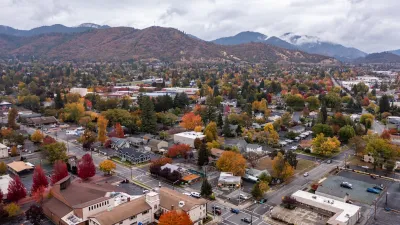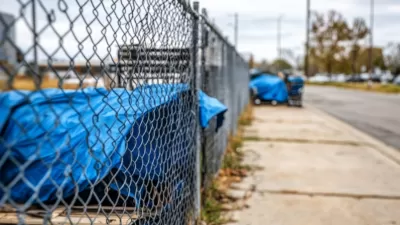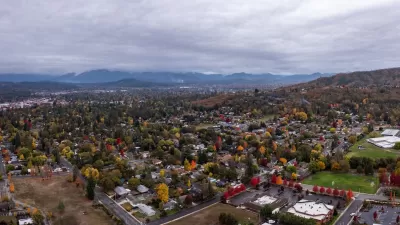The state legislature passed a bill that bans sleeping on state land and threatens to pull state funding from cities with high rates of homelessness.

A Missouri law passed late last month bans outdoor sleeping on state land, which critics say effectively criminalizes homelessness. According to an article by Kacen Bayless and Anna Spoerre in The Kansas City Star, “Public protests have called for Kansas City to find better, long-term solutions to housing the city’s approximate 2,000 people without homes.” The authors add that “The law, which goes into effect Jan. 1, also requires local governments to financially support services like mental health treatments and short-term housing.”
The article continues, “While it passed both chambers of the Missouri legislature in late May, some lawmakers voiced concern about whether arresting those who are unhoused is inhumane.” Empower Missouri’s Sarah Owsley said similar bans have failed to reduce the number of unhoused people sleeping on public streets. “Street sleeping bans also increase the likelihood that unsheltered individuals move deeper into the woods or to more secluded areas that can present more dangerous situations for them, she said.”
The bill is based on similar legislation passed in Austin, Texas, where the city issued 130 citations within the first six months. And while Missouri legislators say the law can help guide people to shelters, the article points out that “Kansas City’s shelters are often full, and many unhoused residents have complained of being turned away.”
The bill also “would penalize local governments with a per capita homelessness rate higher than the state average by prohibiting them from receiving state funding until they’ve lowered it,” threatening already limited funding. Marqueia Watson, executive director of Greater Kansas City Coalition to End Homelessness, called the bill counterproductive to current efforts to reduce homelessness, saying that “by requiring social workers to do anything remotely related to policing homeless people sleeping on state land will break trust and ultimately make it more difficult to get people help.”
FULL STORY: New Missouri law bans outside sleeping. KC leaders say it criminalizes homelessness

Alabama: Trump Terminates Settlements for Black Communities Harmed By Raw Sewage
Trump deemed the landmark civil rights agreement “illegal DEI and environmental justice policy.”

Planetizen Federal Action Tracker
A weekly monitor of how Trump’s orders and actions are impacting planners and planning in America.

The 120 Year Old Tiny Home Villages That Sheltered San Francisco’s Earthquake Refugees
More than a century ago, San Francisco mobilized to house thousands of residents displaced by the 1906 earthquake. Could their strategy offer a model for the present?

In Both Crashes and Crime, Public Transportation is Far Safer than Driving
Contrary to popular assumptions, public transportation has far lower crash and crime rates than automobile travel. For safer communities, improve and encourage transit travel.

Report: Zoning Reforms Should Complement Nashville’s Ambitious Transit Plan
Without reform, restrictive zoning codes will limit the impact of the city’s planned transit expansion and could exclude some of the residents who depend on transit the most.

Judge Orders Release of Frozen IRA, IIJA Funding
The decision is a victory for environmental groups who charged that freezing funds for critical infrastructure and disaster response programs caused “real and irreparable harm” to communities.
Urban Design for Planners 1: Software Tools
This six-course series explores essential urban design concepts using open source software and equips planners with the tools they need to participate fully in the urban design process.
Planning for Universal Design
Learn the tools for implementing Universal Design in planning regulations.
Clanton & Associates, Inc.
Jessamine County Fiscal Court
Institute for Housing and Urban Development Studies (IHS)
City of Grandview
Harvard GSD Executive Education
Toledo-Lucas County Plan Commissions
Salt Lake City
NYU Wagner Graduate School of Public Service





























